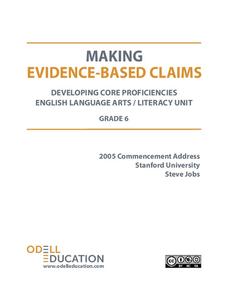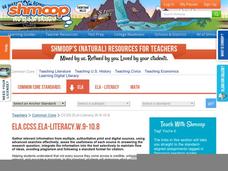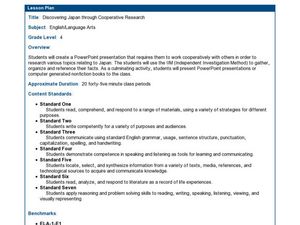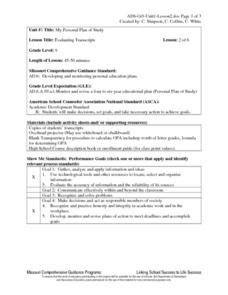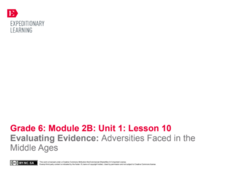Odell Education
Making Evidence-Based Claims: Grade 6
In order to make evidence-based claims, one must be able to draw explicit information from text. From here, learners take that information, analyze the text to develop a deeper understanding, and connect with the information in order to...
Curated OER
Search Warranted?
Young readers work on evaluating claims in a piece of informational text with the article "In New York, It's Open Bag or Find Exits" from the New York Times. They analyze current search procedures implemented to fight terrorism and...
Shmoop
ELA.CCSS.ELA-Literacy.W.9-10.8
Demonstrate the importance of evaluating and citing sources. Pupils can complete the suggested assignment provided here, or one of your choosing, while focusing on checking that the resources are credible and citing those sources...
Curated OER
Changing Seasons
Explore expository writing and using precise language in this descriptive paragraph writing lesson. Learners brainstorm prior knowledge about the changing seasons in Ohio. They describe seasonal items, view seasonal pictures from...
Curated OER
A Way with Words
How do facts and opinions impact the news? After reading "How to Cover a War" from the New York Times, middle schoolers evaluate the claims in the article. They also consider the media's responsibilities in reporting during wartime....
Curated OER
Discovering Japan Through Cooperative Research
Search a variety of sources to create a multimedia or book project about Japan. Learners use the independent investigation method to plan and conduct research about Japan. They use the information they discover to create a computer book...
Curated OER
Gathering, Evaluating,and Organizing Information for a Research Report
It's never too early to build research skills! Students locate information relevant to a subject they are doing a research project on. They take notes and sort the information under main topic headings. Through research, they gain an...
Curated OER
Assessing Research Materials
Teaching learners how to evaluate a research source is an important part of the research process. The fresh idea here is that groups first develop a list of reasons why resources should be evaluated, transform these reasons into...
EngageNY
Mid-Unit 2 Assessment: Inferring About the Silversmith Trade in Colonial Times
The seventh lesson plan in this unit on colonial trade assesses fourth graders' ability to use details from an informational text to make inferences and create a piece of informative writing. The included assessment begins with learners...
Curated OER
Short and Sweet Science
Readers learn how to summarize scientific text and evaluate the advantages, disadvantages, and challenges in writing summaries. They select science-related articles you've pulled and collected from the New York Times and, with a partner,...
Newseum
Reporting Part I: What Matters to Me
Young reporters have an opportunity to craft a news story about a topic that interests them. Class members brainstorm events and issues that affect them and possible sources of information. Individuals then select a topic, research it,...
EngageNY
Grade 9 ELA Module 3, Unit 3, Lesson 1
The opening exercise in this instructional unit introduces class members to the writing process they will follow to craft an informative, expository research paper that addresses their research question. To begin, writers are asked to...
Curated OER
Evaluating Transcripts
Ninth graders review their transcripts and calculate their individual grade point averages. They brainstorm on how they can keep track of their progress in school and what information will follow them throughout their lives. Each student...
Curated OER
Researching Another Country's Holiday: Focusing and Gathering Information
Fifth graders brainstorm a list of holidays celebrated by a majority of people in the United States. They each select an American holiday from the list as well as another country that may have a holiday that is similar. Next, they...
Curated OER
Requesting Information
Students create a letter requesting information from a local vocational agency using word processing software. They send the finished letter to the Office of Vocational Rehabilitation.
EngageNY
Evaluating Evidence: Adversities Faced in the Middle Ages
How is that relevant? Scholars gain an understanding of the words relevant and compelling. They then go back to the End of Unit 1 Assessment Prompt: Adversity in the Middle Ages and look at the second bullet that pertains to relevant and...
EngageNY
Paraphrasing and Evaluating Sources: “Gaming Can Make a Better World”
Explore how gaming might make the world a better place. To dissect the statement, scholars watch video clips about the benefits of video games. While listening, pupils make notes in their researcher's notebooks, attempting to discern the...
EngageNY
Paraphrasing and Evaluating Sources: Pages 112–116 of The Big Thirst
Agriculture and water—it's a fine balance. So how exactly do industry and agriculture currently manage water? Pupils consider the question as they continue reading excerpts from Charles Fishman's The Big Thirst and adding notes to their...
EngageNY
Finding Relevant Information and Asking Research Questions: The Benefits of Video Games
Video games may not be so bad after all. As scholars read the text "The Many Benefits, for Kids, of Playing Video Games," they summarize the gist in their researchers' notebooks. Next, pupils draft supporting research questions based on...
EngageNY
Gathering Information about Water Management: Assessing and Reading Internet Sources, Day 1
It takes time to discover what makes a source accurate and credible. Using everything they've learned about source credibility, scholars begin researching supporting questions about how industry and agriculture manage water. They select...
EngageNY
Gathering Information about Water Management: Assessing and Reading Internet Sources, Day 2
Accuracy, credibility, timeliness ... it's time to act on source reliability! Pupils continue conducting Internet research, selecting two questions about water management from their researcher's notebooks that they want to explore...
Curated OER
Note-Taking: K.I.S.S. "Keep It Short and Simple"
Note-taking is an essential study skill, and it needs to be taught! In the context of a research project on energy sources, learners find multiple sources, evaluating, paraphrasing, and citing them correctly. Two lists with note-taking...
Curated OER
Fast Fact-Finding
Ever wonder why the sky changes color so often? Readers examine an informational excerpt from John Farndon's How the Earth Works. They underline key points as they read and then answer five response questions. Prompts review main points,...
Curated OER
Does Mother Nature Know Best?
Investigate herbal medicine in the science or health classroom with this lesson from the New York Times. After a discussion about class members beliefs about and experiences with herbal medicines, pupils read an article that might impact...


